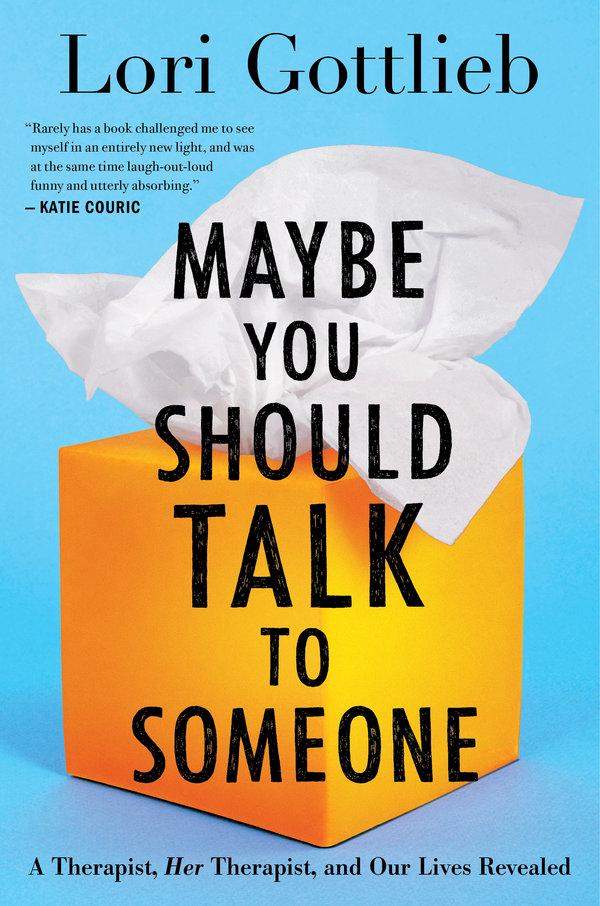MAYBE YOU SHOULD TALK TO SOMEONE
A Therapist, Her Therapist, and Our Lives Revealed
By Lori Gottlieb
Apart from a brief flirtation with psychotherapy in my late 20s, I had never really experienced any kind of intense psychotherapeutic treatment. Then came 2018, which I can best describe as my own personal annus horribilis.
First there was a marriage therapist, who allowed my husband to vent for the entirety of every session, despite me at one point even raising my hand for permission to speak. Who knew a man could go on for 50 minutes about how annoying it is that I occasionally (O.K., often) leave my mail unopened on the front hall table for two days? And that I have three subscriptions to The New Yorker?
The next marriage therapist cleared our chakras with crystal samurai swords, waved tuning forks in our ears and had us write love poems to each other. Which is hard to do when your husband is mad at you about your mail and the fact that you are “personally financially supporting The New Yorker magazine!”
Then there was the trauma therapist, who prescribed eye movement desensitization and reprocessing to get over a couple of disturbing past events (too much to go into there). And the Jungian therapist who urged me to write down my dreams and make them become reality. Miraculously, one night I had a dream about a red zebra-print jumpsuit and the next morning I got an email from Neiman Marcus reporting that a Dolce & Gabbana zebra print jumpsuit was on sale. In my size!
So it was a perfect time for me to read Lori Gottlieb’s “Maybe You Should Talk to Someone,” an irresistibly candid and addicting memoir about psychotherapeutic practice as experienced by both the clinician and the patient. One day, Gottlieb is a perfectly happy psychotherapist in Los Angeles, the mother of a young son, madly in love with the man who wants to marry her. Who suddenly breaks things off because — out of nowhere — he has decided he doesn’t want to spend the next 10 years with a child under his roof. (Specifically, he doesn’t want to have to pay attention to her son’s Lego creations. What a jerk.) And, voilà, Gottlieb has what’s known in the trade as her “presenting problem,” the issue that gets you into therapy in the first place, but which is really just the touchstone for what are probably many more deeply embedded issues.

Therapy, she writes, “elicits odd reactions because, in a way, it’s like pornography. Both involve a kind of nudity. Both have the potential to thrill. And both have millions of users, most of whom keep their use private.” Her book does feel deeply, almost creepily, voyeuristic. (In an author’s note, she reports that she got written permission from her patients to write about them and went to great lengths to disguise their identities, sometimes conflating several individuals into one.)
[Read our Q. and A. with Lori Gottlieb here]
Gottlieb explores her patients’ inner demons — a young newlywed diagnosed with terminal cancer, an older woman who finds life meaningless and intends to commit suicide on her next birthday, a self-absorbed Hollywood producer, a woman stuck in a cycle of alcoholism and damaging relationships — and simultaneously peers into her own psyche with Wendell, a middle-aged, cardigan-sporting psychotherapist.
John, the producer, comes in complaining that he’s surrounded by idiots — at home, at work — but eventually reveals that he’s still grieving over the death of his young son years ago. Julie, the dying young woman, chooses to spend her last months working as a cashier at Trader Joe’s, where she feels more joy than at her tenure-track university job. Gottlieb herself reveals that she’s Google-stalking her ex-boyfriend. “Therapists talk a lot about how the past informs the present,” she writes, and changing your relationship to the past is “a staple of therapy. But we talk far less about how our relationship to the future informs the present too.” But “when the present falls apart, so does the future we had associated with it. And having the future taken away is the mother of all plot twists.”
Gottlieb knows her plot twists. Before she trained as a therapist, she worked as a writer for TV shows like “ER.” She’s also the author of the Dear Therapist column in The Atlantic magazine. “I’ve always been drawn to stories,” she confesses, “not just what happens but how the story is told.” In showing us how patients reveal just a part of their selves, she gives us a dizzily satisfying collage of narratives, a kind of ensemble soap opera set in the already soap operatic world of Los Angeles. (The book is now being developed as a series with Eva Longoria for ABC.)
Gottlieb can be judgmental and obsessive, but she’s authentic, even raw, about herself and her patients. One young woman, Becca, complains about her lackluster social life, yet lacks any curiosity about herself — or even much willingness to think with any depth about why the people at work and her boyfriends eventually turn away from her. Gottlieb gets so bored and frustrated by their sessions she has to do jumping jacks and eat chocolate before each appointment to keep herself focused. And eventually Gottlieb “breaks up” with Becca. Poor Becca, rejected by all around her, including her therapist! That chapter sent me into a tailspin, worrying that the therapist I saw in my late 20s, who told me I was doing fine and probably didn’t need to see her anymore, just found me too boring.
After my traumatic year, I read Gottlieb’s book with more than a critic’s eye. At some point in our lives, we do have to let go of the fantasy of creating a better past, with the perpetual regret that brings, and forge on into the future. Memo to self: Cancel those two extra subscriptions to The New Yorker.

